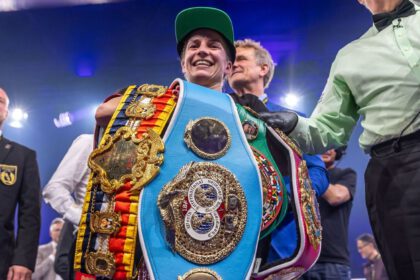In January, after the Australian Open final, Aryna Sabalenka, visibly frustrated, smashed her racket against the ground. Madison Keys had caused the upset, and Sabalenka was left at the gates of her third consecutive Grand Slam title. The disappointment of the Belarusian tennis player spread around the world through the screens.
Months later, in the Roland Garros final, Sabalenka fell again, this time to Coco Gauff. The anger of the world number one was evident in her post-match speech and in the press conference, which went viral for the wrong reasons.
Weeks later, at Wimbledon, Amanda Anisimova eliminated her in the semifinals in an exciting three-set match. Sabalenka left the court, and the tournament, dejected and confused. Despite having been the world number one throughout the season and having won two level 1000 titles, she failed to deliver in key moments. She took some time off from tennis, trying to reset and learn from everything that had happened.
The 27-year-old tennis player arrived in New York hungry, even desperate, to redeem her year and close the Grand Slam season defending her title. On Saturday, all the hard defeats and the agony of repeated defeat she had felt throughout the season seemed worthwhile. Her coach, Jason Stacy, stated that he began reading a motivational book called “Into the Magic Shop” after Roland Garros. He called it a “fairy tale,” and in New York, Sabalenka had her own fairy tale ending.
Facing Anisimova again, though this time in an Arthur Ashe Stadium with the crowd mostly in favor of the American, Sabalenka won her fourth Grand Slam title with a 6-3, 7-6 (3) victory in 94 minutes.
“Those two finals where I completely lost control of my emotions, I simply didn’t want this to happen again,” said a radiant Sabalenka shortly after during an interview on the Alofoke Deportes broadcast. “And there were some moments when I was about to quit. But I thought, ‘Come on. You can’t do that. You just have to stay focused and keep going, keep trying.’ And it has really helped me.”
Aryna Sabalenka

But with all that, a very high level of expectations has arrived, and she herself has put an even greater degree of pressure on herself. Not achieving what she knows she is capable of doing has led her to breakdowns, such as the racket clash in Melbourne, as well as her speech and comments in Paris. After her 6-7 (5), 6-2, 6-4 defeat to Gauff in the French Open final, Sabalenka was in tears, and then blamed the gusty wind for her performance.
“The conditions were terrible, and it was just better in these conditions than me,” Sabalenka told reporters. “I think it was the worst final I’ve played.” Sabalenka was immediately labeled a bad loser, and some of her other comments about Gauff were even worse received by the public. (She later apologized, and Gauff gracefully accepted). Sabalenka and her team then focused on the challenge of how Sabalenka could find a way to win when she wasn’t playing her best game or the conditions weren’t ideal. Max Mirnyi, former world No. 1 doubles player and six-time Grand Slam doubles champion from Belarus, joined Sabalenka’s team before the hard court season, and has continued to repeat that lesson for as long as they have been together. “One of my main starting phrases when entering the team and sometimes speaking directly with Aryna is to convey the message that the perfect tennis match doesn’t exist,” Mirnyi said on Friday. “Perfection doesn’t exist on a tennis court. You can take the best matches of Novak Djokovic and Roger Federer or Steffi Graf… there will always be things that don’t go as planned, and it’s the best champions who know how to respond and adapt in the moment, on the fly.”
“You can’t make these kinds of mistakes at important points,” she said. “Sometimes it can be crucial, from my experience. So yes, that was the moment, but then I turned around, took a deep breath and thought: ‘Okay, it happens. It’s already in the past. Let’s focus on the next one'”.
Aryna Sabalenka
Two games later and a tiebreak ensued. But instead of faltering under the pressure, Sabalenka, who had won her previous 19 tiebreaks, took control. Although she needed three match points, and exhaled deeply before each one, the outcome hardly seemed in doubt, and the extra points were just a mere formality.
After being announced as the 2025 US Open champion, Sabalenka reached her team in her box. While many players run off the court and up the stairs, as Sabalenka has done before, she took her time, walking and high-fiving fans before embracing each member of her coaching team, as well as her agent and friends. “It’s been a tough year with those finals,” Sabalenka said moments later during the trophy presentation as she addressed her team. “I was really terrible to you, but come on. Is it worth it, right? Thank you very much. I love you. You are my family.” With thousands of fans watching during her televised interview, Sabalenka said she was going to have a few drinks at the bar on site to start her celebration because, “You have to enjoy it” after all the hard work. As she spoke, and the smile continued to radiate on her face, it became clear that as devastating as the previous defeats in the final were at the time, it made Saturday’s triumph even sweeter. And upon seeing Anisimova’s stunned face, stained with her own tears after losing in her second consecutive Grand Slam final, while on stage holding her runner-up trophy, Sabalenka couldn’t help but convey that feeling. “I know how much it hurts to lose in the finals,” Sabalenka said as she turned and looked at Anisimova. “But trust me, the moment you win the first one, and you will win it… you will enjoy it even more after all the tough defeats in the finals.”








